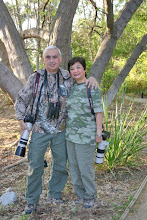Which in turn got the attention of bee-eating birds. I watched the amazing providence of nature unfold before me and noticed something interesting: birds that prey on bees do so by catching the insects at their behinds - where the stingers are - and not grabbing them by the head as I expected. Which brought about even more questions to ponder...Wouldn't it be a quicker death to the bee if the birds bit the head? Isn't the sting of the bees poisonous..wouldn't that hurt the tongue of the bird?
Answers, anyone?
Black Phoebe
Cassin's Kingbird






9 comments:
Very interesting observations a d photos. I wonder if the bird's beak is hard enough so that the stinger does not worry it? If the bird caught the bee by its head it would certainly bend around and put the stinger in somewhere possibly unwanted!
Nice captures Bob. Maybe they are pulling out the stingers before swallowing the bees and you missed it ;-)
I always watch Bee-Eater (Merop sp.) eating their catch with amazement.
They catch the bee on wing and whack the bee on perch.Swallow it whole without second thought. No harm done to the tongue. They do it all over again and again.
Maybe they are afraid, that if they would bite the head, they get stung in "the nose"?
Awesome catches though!
Thanks for the information, but I have no answers to the question. Maybe the poison is harmfull only when it comes into the bloodstream. Very good images :)
I don't have the answers, either, but it's an interesting question.
Great detail in the photos, Bob. Looks like you had a great day in the park.
It is an interesting question, sorry I do not have the answer. Both of your photos are wonderful.
I am taken with the BLPH - when in the west, I have tried to get photos of the bird - very difficult. It doesn't stay put, is wary & flies quickly. so I've got nil. Good photo of a difficult bird to photograph
the shot on Cassin's Kingbird is lovely.
Post a Comment